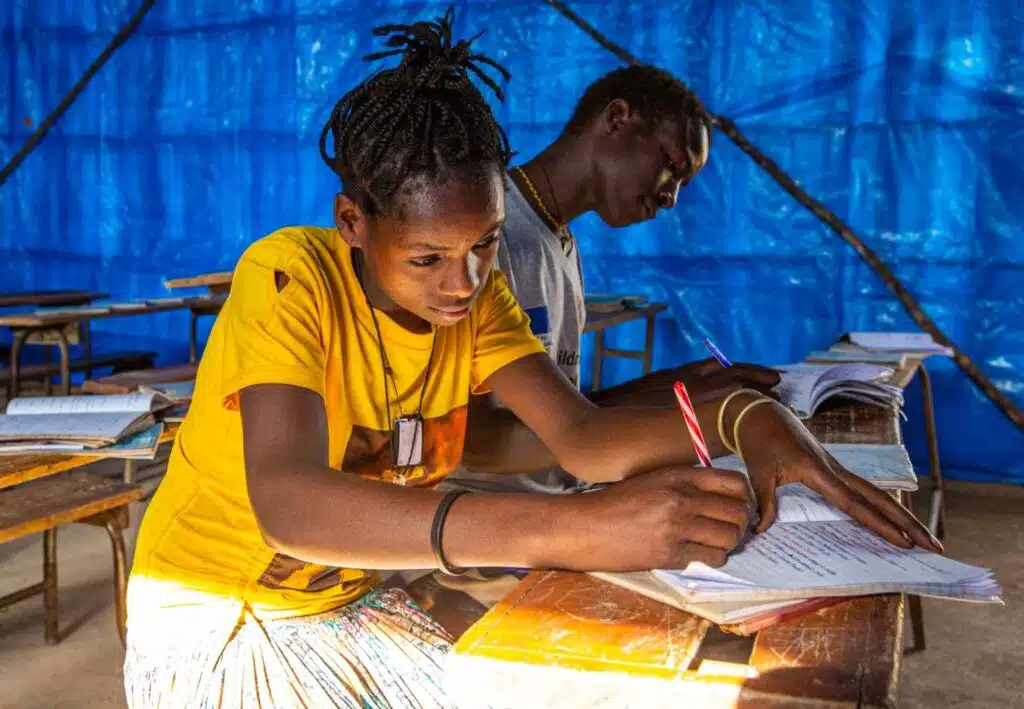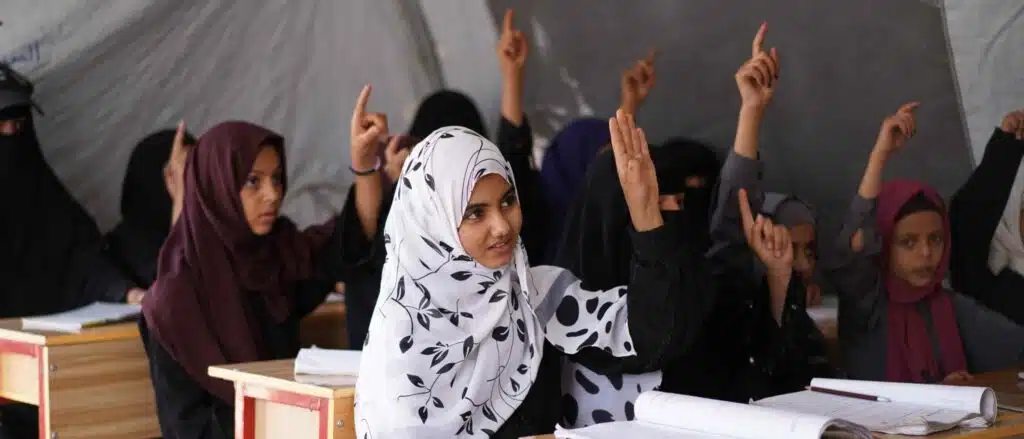Poor access to education can undermine people’s potential to improve their lives. The International Rescue Committee provides children, youth, and adults with educational opportunities that help keep them safe and learning the skills they need to survive and thrive. Almost a third of all crisis-affected children lose access to education. Here’s what the IRC is doing to help.
Everyone has the right to education. However, 224 million children affected by crises need educational support, including more than 72 million who cannot attend school. Those who can continue learning face numerous barriers to accessing a quality education. Education is a critical foundation in promoting livelihoods, safety, and human rights. The IRC is implementing innovative solutions to provide crisis-affected children with education opportunities on a global scale. Below, we explore the importance of education in crisis-affected regions and identify ways to support education for all.
Why is education essential?
Education is a fundamental right under the Universal Declaration of Human Rights and it extends to all children, including those experiencing crisis. According to IRC education and early childhood development policy advisor, Elana Banin, “Education is lifesaving. It’s a dual-purpose solution that protects vulnerable children in the short term and ignites their long-term capacity to contribute meaningfully to their communities and families.”
In regions prone to crises, education prepares communities to adapt. Schools and teachers impart life-saving lessons, complement health care services, and help distribute aid in the form of in-kind humanitarian aid or cash assistance. The power of education is simply undeniable.
How are children’s education affected when a crisis strikes?
Crises, such as conflict and climate shocks, disrupt education causing children to leave schools. However, over two-thirds of those who continue their education do not achieve proficiency in reading or math. Families affected by crises are often displaced for long periods of time, with refugees experiencing an average displacement of 20 years and internally displaced people an average of 10 years. If world leaders do not address the educational barriers that arise during crises, it is estimated that 825 million youth will lack the necessary skills to contribute to the workforce by 2030.
“Despite the vast and growing education needs of children and youth in crisis contexts, education remains a severely underfunded aspect of humanitarian responses globally, receiving less than three percent of humanitarian aid annually,” explains IRC senior director of education, Emma Gremley. “The international community must honor the right of every child to a quality education through sustained funding and a commitment to delivering impactful, innovative and contextualized support for programming.”
How does a crisis impact education for vulnerable groups?
During a crisis, vulnerable groups – particularly women and girls – are often excluded from education due to discrimination, violence, and harmful practices like child marriage. This leads to young girls dropping out of school to take on domestic tasks or generate income.
Displaced children face challenges accessing quality education including adapting to new schools and cultures that impact their learning ability. “Adversity has physical impacts on the brain and can impede a child’s ability to grow both physically and mentally,” explains Banin. “One of the first priorities in a crisis is to help children heal from traumatic experiences. Then, we can work to empower children through the tools of education to rise above it.”
During times of crisis, young children are especially vulnerable and disadvantaged. The first five years of a child’s life are considered the most critical stage of development, but crises disrupt the nurturing environments that are essential for their growth. Despite the significant impact of humanitarian crises on young children, only 1.2% of education aid from donors is allocated to early childhood education. “By investing in these early years, we can catalyze progress and facilitate long-term development and learning,” says Banin.
For students like sixteen-year-old Asamench Asmisalu, education is a critical part of her recovery from crisis. Asamench’s family, like many others in Ethiopia, were displaced from their homes by severe drought and conflict. “We used to have mango trees which were a source of income but they were destroyed during the conflict,” says Asamench. “Our belongings were looted. I stopped my education for a while because the school’s closed due to the conflict.” Asamench and her family relocated to Konso, Ethiopia. She now attends a temporary learning center constructed by the IRC to support drought and conflict-affected communities in the region.
What is the IRC doing to support education in crisis-affected communities?
The IRC is a global leader in providing customized education services to assist communities affected by crises. The IRC aims to provide children with safe, quality education opportunities that equip them with essential skills to survive and flourish, no matter their location.
“We recognize both the incredible challenge and opportunity of meeting these populations where they’re at,” says Banin. “We want to foster a world where children are given the opportunity to thrive because they can make our world a better place.” The IRC is active in more than 50 crisis-affected countries around the world, working to help people survive, recover, and rebuild their lives. A cornerstone of our work is promoting educational outcomes in the communities that need it most.

Sulaima* enrolled her five-year-old daughter, Mira, and three-year-old son, Jawad, in the Ahlan Simsim program in Amman, Jordan where the family found refuge after being displaced from their home in Syria due to conflict. “The program is full of activities that are so joyful and motivating,” says Sulaima. “My kids started to draw and art became their way of expressing themselves.”

Asamench is happy to be back in school after intense conflict disrupted her studies and uprooted her family from their home. She now attends a temporary learning center where the IRC supports students with cash assistance and scholastic materials.

A young student spells out the word “moon” during an active learning lesson as part of the PlayMatters program in Kitgum, Uganda.



